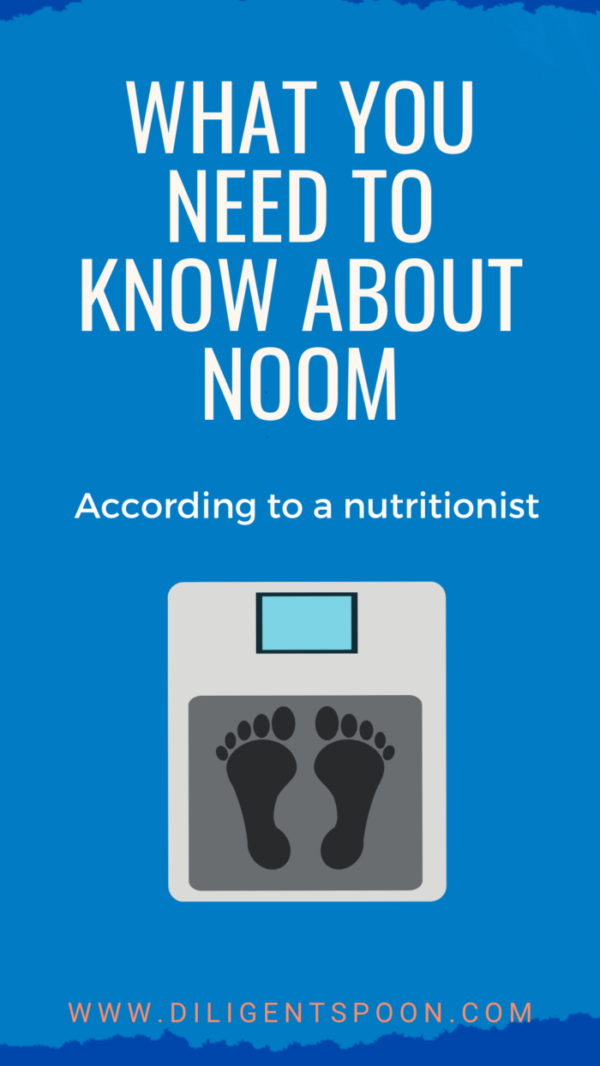
What you need to know about Noom, according to a nutritionist
Update!!
Back in January 2020, I published a post on why Noom is not for me. This fall (2020), I decided to check out the weight loss app again to see if anything had changed. Noom is still not for me for a long list of reasons. And, as a nutritionist, there are six things I think you need to know about Noom before you try or buy.
Praise for Noom:
Noom works like a Christmas miracle for some people! That’s awesome, and I’m glad that an app like Noom can really make a difference in so many lives. Noom even has a CDC-endorsed Diabetes Prevention plan, which is a valuable and unique tool.
The Good Change: Noom limits the most extreme weight loss
The good news is Noom has made one change for the better – the app now has a limit on extreme weight loss! When I tried Noom in January 2020, I was able to enter any goal weight, no matter how low. Since that time, it looks like Noom has added a limit on low goal weights, based on BMI (body mass index).
As of September 28, 2020: I tried to put goal weight as 100 lbs, and I got the message that Noom isn’t designed to reach a goal weight that is underweight:

However, it will still let me set a goal weight that slightly less than my current weight, so I was able to give the app a spin.
6 things I know about Noom
Note: these observations are made from using my phone, an LG G7 ThinQ running Android OS version 9.
Calorie recommendations are too low
For me, the Noom app recommends 1200 calories per day. For a bit of reference:
- A starvation diet is generally anything under 800 calories per day
- My resting metabolic rate (RMR) is 1400 calories per day.
- What is RMR? How many calories are required by your body to perform the most basic functions – to keep itself alive – while resting.
- Last time I checked, I was consuming nearly double the calories Noom prescribed for me.
Noom’s calorie recommendation is barely enough to keep all my bodily systems going. Furthermore, I’m pretty sure I would be a food-obsessed, rage machine if I had to limit my food intake to 1200 calories/day.
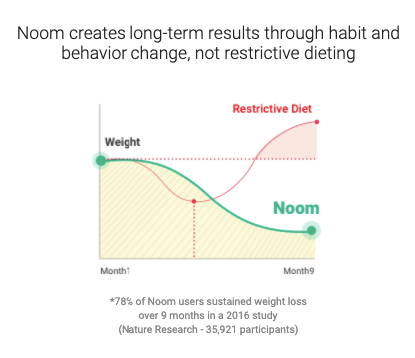
There are many reasons (hormone imbalance, physical and mental performance, lots of others) that a low calorie-diet like this is unhealthy long-term. Although explaining them is outside the scope of this post, check out my own undereating experience here and here.
Noom’s bar code reader for adding foods is useless
MyFitnessPal‘s barcode reader is like a ninja – it will sniff out and pick up a bar code in the dark of night with your kid tossing the package across the room.
In sad contrast, Noom’s barcode reader is a perpetually confused feature, trying to focus and pinpoint each barcode, no matter how well-lit and stably-held. After a few frustrating moments of re-focusing on the barcode to no avail, the app stops and I get a black screen. Manual entry it is!! Frustration ensues …
Noom harrasses you to weigh yourself every day
Daily weigh-ins, IMO, are a sure way to feel horrible about yourself almost every day. As women, our weight can fluctuate up or down by FIVE POUNDS on any given day, even if you weigh yourself at the same time. I have enough drama in my life without suffering through weigh-ins every day. We are not high school wrestlers, we are grown-a** women!
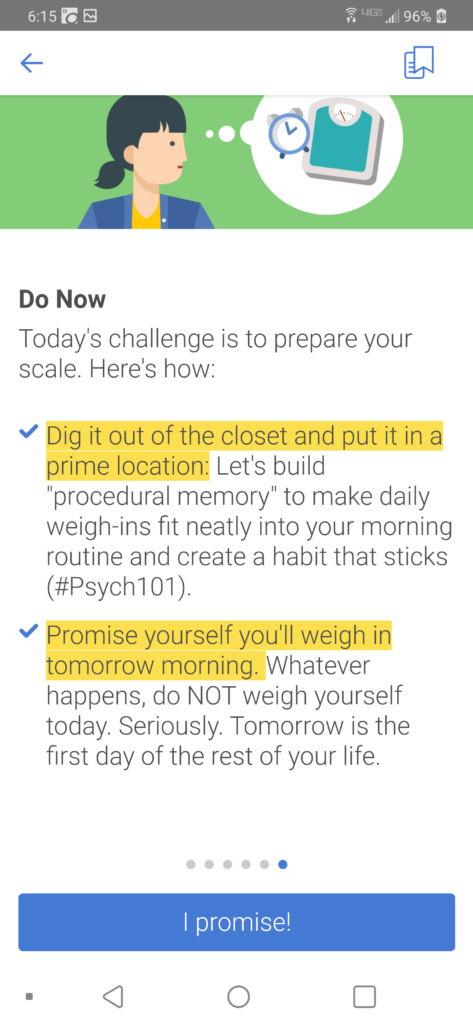
If you forget to weigh in, Noom will remind you with an annoyingly patronizing message like, “Now that you’ve weighed yourself (wait, you still haven’t? What would Michael Jordan say? Just do it. Right now. We’ll wait…)” Wha?? This is not basketball …
Noom’s food categories are flawed
I understand that it’s tricky to categorize every food in the best way. Still, I can’t get over the fact that sugary nonfat yogurt is a “green” food (eat as much as you want), while plain, whole milk yogurt is “red”.
In the screenshot below, Noom categorizes nutrient-dense whole foods like almonds, chia seeds, and red meat alongside desserts. Yes, these are calorie-dense foods. However, meat, nuts, and seeds are full of protein, fat, or fiber, and a host of other nutrients. For me, this means that they are distinctly different than, say, a cupcake.
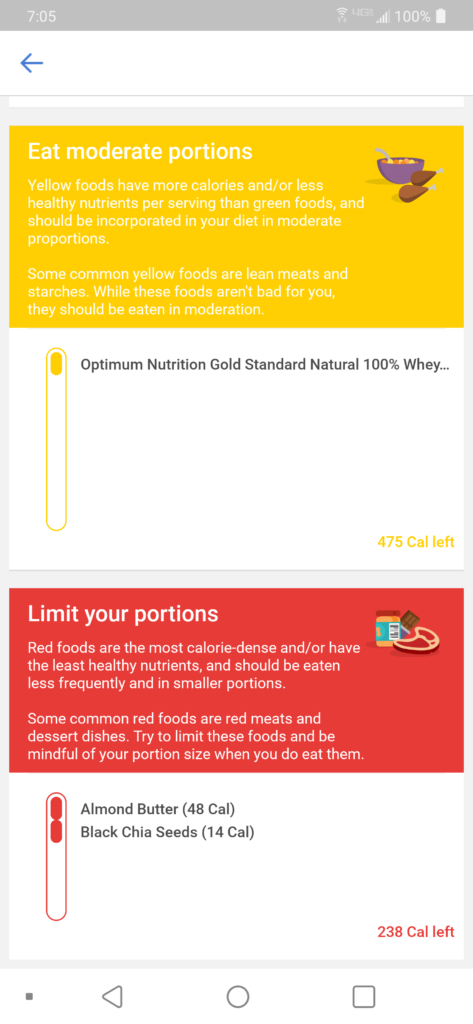
Noom doesn’t work with some fitness trackers
In order to track my steps or other exercise to be recorded in Noom, I have to enter it manually, because the app doesn’t sync with Garmin devices. That’s a deal-breaker for me – I can only manually enter so many things before my eyes start twitching and I mutter “red rum, red rum, …”
It’s annoying to me (and I don’t love my phone enough) to log my weight, everything I eat, and all my physical activity – every day.
Noom’s health coaching doesn’t work for everyone
First, Noom’s health coaches are real people, but they are not nutritionists. Noom’s health coaches are certified through a four-week program called “Noomiversity.” Health coaches do go through training, but they do not have to have any other certifications, licenses or degrees. Furthermore, health coaches are not qualified to provide detailed meal plans or nutritional advice for medical conditions.
The tone of the health coaching is patronizing to me. I’m not 8 years old, but I feel like I’m being talked to like a child. Coaches’ responses come off as superficial, canned, and sometimes just not relevant. This isn’t a criticism of the coaches themselves – I’m sure they’re working their tails off coaching a gazillion people at a time. When coaching to the masses, messaging will be generalized.
Noom feels elitist
I get it that Noom is marketed to Millenials that have some extra income, and (even more likely) extra time. Still, I the food color-rating (green, yellow, red) system often demonizes foods that are less expensive and glorifies pricier ones. For example, is a single mom working two jobs going to food shop multiple times a week to stock up on fresh veggies? Nope.
What I’m getting at is …
Bottom Line: Noom is not for everyone
I know, I know – the app is not for single moms working two jobs. But, maybe it should be. By that, I mean that it would be nice if Noom were less “one-size-fits-all” and more “What is important to you, and how can we get there without making you insane, starving, and dependent on this app?”
As a nutritionist, my concern is for the long-term success of pushing weight loss through really low-calorie diets.
That’s exactly where interaction with actual people comes in. Noom is an app with people behind it, but it mostly runs on algorithms. People are not algorithms (we’re really close sometimes, but we still have free will, gosh darn it!), and eating is a unique and emotional experience for most, if not all of us.
Wanna talk about it?
My mission is to help women who have big goals find a happy & healthy way of eating, while saving your time and energy.
I’d love to chat with you about your nutrition goals and challenges – and how we can work together to check them off your list. Email me directly at [email protected] or message me on any of the Diligent Spoon social media channels.
Have a wonderful day!!
References
DRI Calculator for Healthcare Professionals, www.nal.usda.gov/fnic/dri-calculator/.
Capritto, Amanda. “Noom vs. Weight Watchers: What’s the Difference?” Clean Plates, 21 Apr. 2020, cleanplates.com/tips-eat/noom-vs-weight-watchers-difference/.
Cassetty, Samantha, and Rd. “What You Need to Know about the Weight-Loss App Noom, According to a Dietitian.” NBCNews.com, NBCUniversal News Group, 24 Apr. 2019, www.nbcnews.com/better/lifestyle/what-you-need-know-about-weight-loss-app-noom-according-ncna996026.
Comana, Fabio. “Resting Metabolic Rate: How to Calculate and Improve Yours.” NASM, blog.nasm.org/nutrition/resting-metabolic-rate-how-to-calculate-and-improve-yours.




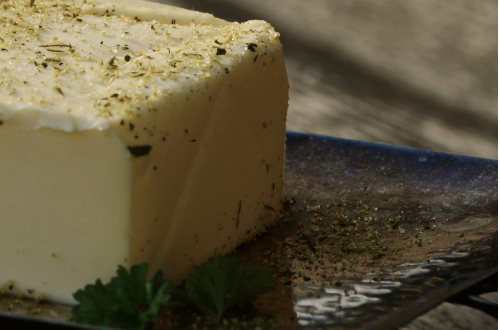
3 Comments
Susan
I couldn’t agree more! I was surprised when my daily calorie limit was 1300 calories when I am 70 inches tall and 150 lbs. I wrote I wanted to go slow and steady. I am currently at a good weight but wanted to work on curbing emotional eating and reduce sugar. I was surprised when my organic almond butter landed in the red category. This app doesn’t feel right to me.
Zee
I could not agree with your thoughts more! I was reccommeded 1200 calories as well and even though I’m short, I don’t think it’s healthy or sustainable to eat so few calories. I also do not agree with their color coded food classifications. Whole yogurt is good for you! But not according to Noom. So crazy. On top of all of this, their interface is the wonkiest of them all. The food button is hard to find, there’s no way to go back easily after you’ve entered a food unless you hit “done,” and I can’t track my macros, and above all, I can’t copy foods from one day to the next or plan ahead and enter food on a future date. It’s really for people with a lot of time to read and who don’t know much about foods to begin with. Dislike and cancelling!
Brook Hagen
I 100% agree with everything you pointed out about Noom, too! Thank you so much for sharing your thoughts and experience. 😊